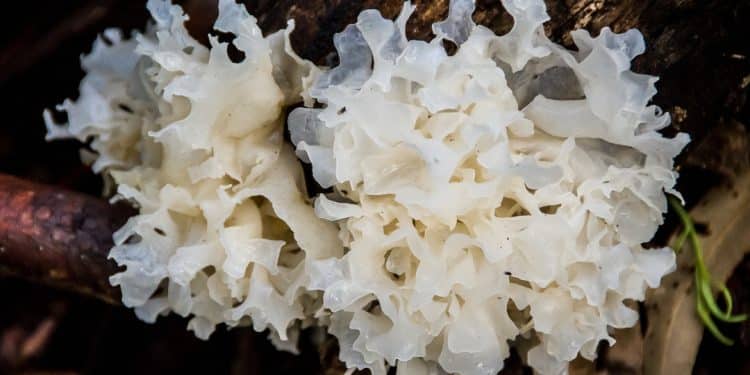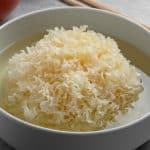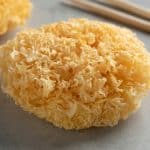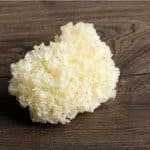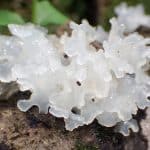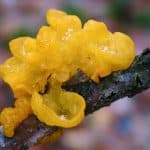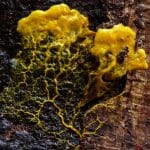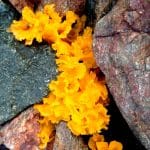Introduction to Snow Fungus
Snow Fungus is an edible mushroom belonging to the family Tremellaceae. It is also known as the Snow mushroom, Silver Ear, Snow Ear, White Wood Ear, and White Jelly Fungus, because of its distinctive features, and because it is usually found attached to fallen branches of broad-leaved trees.
It has a white-to-pale yellow color, a soft, gelatinous texture that is nearly translucent, and shape resembling an underwater coral. Snow mushrooms are typically found in Asia, but are found worldwide in tropical climates, including in South and Central America, Australia, New Zealand, and the Pacific Islands. It has been used for years in Chinese medicine as a medical herb for promoting health and longevity.
Nutritional info of the Snow Mushroom
There is no current available information about the nutritional content of the snow fungus. However, it is probable that its nutritional profile is similar to other wild mushrooms, or mushrooms as a whole. In general, mushrooms are generally low-calorie, providing little in the way of protein and fiber.
Adding fiber to your diet can help reduce your risk for heart disease, diabetes, obesity, and gastrointestinal diseases.
Mushrooms, overall, also provide a low-level supply of vitamin D, zinc, calcium, and folate, all of which play a pivotal role in immune system, bone health, and brain development, respectively.
7 Benefits of Snow Mushroom
Snow Fungus is evaluated for its numerous health-promoting effects, mainly due to its carbohydrate chains, known as polysaccharides, which are the same compound found in the more famous functional mushrooms.
However, studies are limited, primarily conducted on animals and test tubes. So, remember, while the results look promising, research needs to be done on humans.
1. Snow Mushroom May be anti-inflammatory
Inflammation is the natural way that your body reacts to injuries and supports your healing process. It usually goes away after your wound has healed. However, if your body stays in a constant state of inflammation, this is called chronic inflammation.
Inflammation is linked to increased risk for heart disease and cancer. Chronic inflammation is also associated with increased levels of pro-inflammatory markers such as nitric oxide, interleukin-1 beta, interleukin-6, and tumor necrosis factor-alpha. Test-tube studies have shown that snow mushroom extract has an anti-inflammatory effect, which is able to reduce said pro-inflammatory markers.
2. Snow Fungus May have antioxidant properties
If you have an excessive amount of free radicals in your body, this may cause oxidative stress, which may lead to adverse health effects such as cell damage and tissue damage. Antioxidants are molecules that help to neutralize free radicals, thereby protecting your body against oxidative stress. Test-tube studies suggest that polysaccharides of the snow fungus can lower oxidative stress by fighting off free radicals. This could help protect against some chronic diseases.
3. The Snow Mushroom May promote brain health
Snow mushroom polysaccharides can protect your brain cells from damage from neurons and from degenerative diseases. One test-tube study found that snow fungus extracts can decrease the toxicity in the brain caused by beta-amyloid, a protein linked to Alzheimers development at elevated levels.
Studies have also suggested the extract might enhance memory. An eight-week trial of 75 individuals found that taking 600 or 1,200 mg a day of the snow fungus extract improved performance on memory questionnaires, particularly on the short-term memory parameters, when compared to the control group. Similarly, one 14-day study in rats showed that a daily oral treatment of a snow fungus extract significantly reversed the drug-induced memory loss.
4. May Improve your immune system
Tremella mushrooms bioactive compounds can stimulate certain cells in the immune system to protect against it. One test-tube study concluded that a protein found in snow fungus could boost the activity of macrophages, the kind of white blood cells that kill bacteria and clear damaged tissues. Another study showed its polysaccharide could help modulate immune responses and decrease death related to infections in laboratory-induced infections of mice.
However, further studies on humans are needed to better understand what it means for human health.
5. The Snow Fungus May improve skin complexion
Snow Mushroom is a favorite of the beauty world for it is anti-aging and moisturizing properties. Its polysaccharides can enhance the moisture of skin, decreasing the water loss in skin after exposure to sunlight or UV radiation. More importantly, snow mushroom polysaccharides form a clear film, which enhances water preservation when coated onto skin. Thus, they can function as a natural moisturizing and anti-wrinkle agent.
6. Snow Fungus May help control blood sugar levels
Polysaccharide from the mushroom can also help reduce blood sugar levels, acting on several anti-diabetic pathways. For instance, an animal study determined that snow fungus polysaccharides can significantly reduce blood sugar levels and improve insulin sensitivity, which is the way that your cells respond to the hormone insulin.
In addition, tests in the tube have found that snow fungus extracts can positively affect enzymes and hormones associated with diabetes. The studies suggested that snow fungus might inhibit the aldose reductase activity. Increased levels of this enzyme can lead to eye and nerve damage in diabetics. Other studies have shown that polysaccharides from the snow Fungus can normalize levels of both resistancein and adiponectin, two hormones that can cause insulin resistance if altered.
7. Snow Mushroom can help lower heart disease risk
Compounds found in the snow fungus can also protect against heart disease. One test-tube study suggests the antioxidant activities of mushrooms can prevent LDL (bad) cholesterol from being oxidized. Evidence shows that LDL oxidation is involved in triggering and progressing to atherosclerosis, which is the buildup of plaque in your arteries, which is considered a risk factor for high blood pressure and stroke.
Potential Side Effects | Is Tremella Mushroom Safe During Pregnancy?
There are no reports of undesirable side effects or toxicity with consumption of snow fungus. Even then, pregnant women should avoid it as a safety precaution. Also, it is discouraged to hunt for snow mushrooms in the wild. You run the risk of mistaking an edible mushroom for a toxic mushroom, causing a serious health concern. Snow Fungus is a medicinal mushroom found in the wild and has been used for centuries in Chinese medicine.
It is high in fiber and chains of carbohydrates called polysaccharides, providing it health benefits such as improving the health of the brain, heart, skin, and immune system.
However, remember, research on humans is limited, and much of the supposed benefits are backed only by tests tubes and animal studies. Snow mushrooms do not have any reported side effects, and they are easily added to the diet.
You can find our favorite capsules and powders on the following pages of our website and learn more about each individually:
The Best Tremella Mushroom Powder
Learn more:
